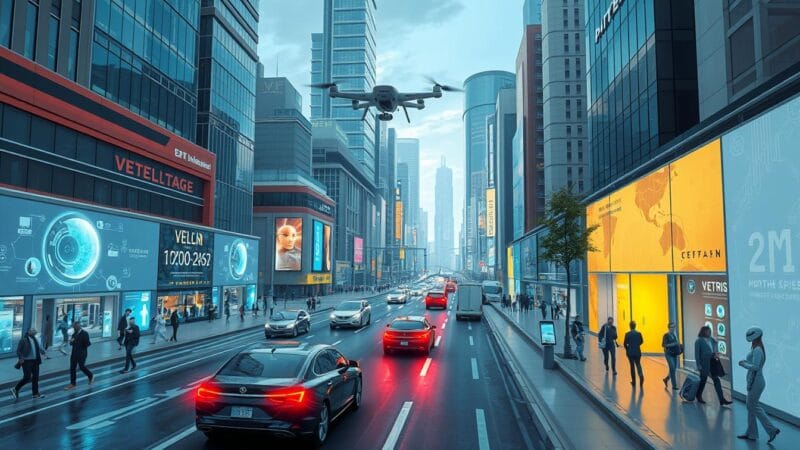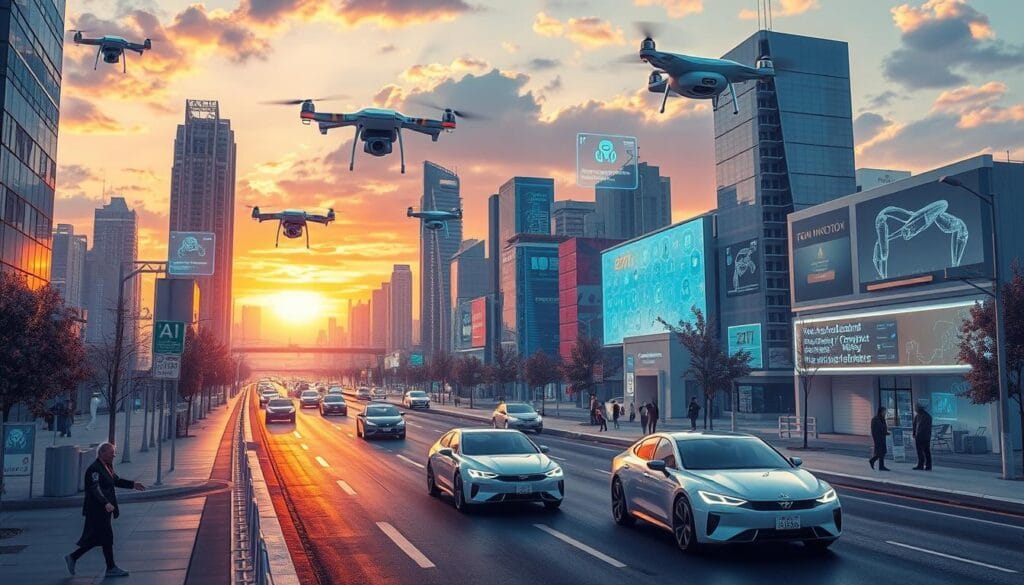AI Applications: From Chatbots to Self-Driving Cars

Did you know the global AI market is set to hit $190 billion by 2025? This huge growth shows how Artificial Intelligence (AI) is changing many industries. It’s making customer service better and helping create self-driving cars. In this article, we’ll look at how AI is used in many ways, showing how it’s shaping our future.
Key Takeaways
- AI is changing many industries, from customer service to transportation.
- Chatbots, powered by natural language processing, are changing how we talk to businesses.
- Machine learning is using data to drive new ideas and decisions.
- Computer vision is helping make self-driving cars possible, with better object detection.
- AI is also making big changes in healthcare, cybersecurity, and finance, among others.
From Chatbots to Self-Driving Cars: A Complete Look at AI Applications
Artificial intelligence (AI) has grown a lot from the chatbots we know today. It’s now changing many industries and improving how we interact with technology. AI’s reach is vast, from chatbots to self-driving cars, thanks to natural language processing and machine learning.
Chatbots are a big part of AI today. They use natural language processing to talk like humans. This helps in customer service, making shopping online better and more personal.
| AI Application | Industry Impact | Key Benefits |
|---|---|---|
| Chatbots | Customer service, e-commerce, financial services | Improved customer experience, 24/7 availability, cost-effective support |
| Autonomous Vehicles | Transportation, logistics, delivery services | Increased safety, reduced traffic congestion, efficient transportation |
| Computer Vision | Retail, security, healthcare | Automated object detection and recognition, enhanced surveillance, improved medical diagnosis |
Autonomous vehicles are another big step in AI. They use computer vision, machine learning, and sensors to drive safely. This change is making roads safer and changing how we travel.
AI has come a long way from chatbots to self-driving cars. As AI keeps getting better, we’ll see even more amazing things. These advancements will change many industries and our daily lives.

Chatbots: The Future of Conversational AI
Chatbots are leading the way in AI technology, changing how businesses talk to customers. They offer a smooth and personal experience, moving beyond old customer service ways.
Natural Language Processing: The Foundation of Chatbots
Natural language processing (NLP) is key to chatbots. It lets machines understand and answer human talk. Thanks to NLP, chatbots can get the meaning behind what users say, giving back smart and relevant answers.
Chatbot Applications in Customer Service and E-commerce
Chatbots are used in many fields, but they shine in customer service and e-commerce. They work around the clock, helping customers fast and keeping them happy. In online shopping, chatbots help with buying, suggest products, and solve order issues, making shopping better.
| Chatbot Applications | Benefits |
|---|---|
| Customer Service | – 24/7 availability – Faster response times – Personalized interactions |
| E-commerce | – Product recommendations – Order management – Seamless purchasing experience |
As more businesses use conversational AI, chatbots will change how companies talk to customers. They promise better efficiency, personal touch, and connection.

Machine Learning: Unlocking the Power of Data
In the world of artificial intelligence, machine learning is a game-changer. It changes how we make decisions based on data. This tech lets systems learn and get better over time, without being told how. It unlocks the power of big data and brings new ideas to many fields.
At its core, machine learning finds patterns and insights in lots of data. It uses smart algorithms to understand complex data on its own. This means it can spot trends and make smart choices. It’s changing how businesses work and how we get what we need.
Think of chatbots and self-driving cars. Machine learning makes these AI solutions possible. It helps companies work better, be more creative, and offer more value to their customers.
| Machine Learning Applications | Industries Impacted |
|---|---|
| Predictive Analytics Personalized Recommendations Computer Vision Natural Language Processing Anomaly Detection | Healthcare Retail Finance Transportation Cybersecurity |
Machine learning is growing, and so are the chances for businesses to use data wisely. By using this tech, companies can get better, be more personal, and stay ahead in the digital world.

Computer Vision: Enabling Autonomous Vehicles
In the world of self-driving cars, computer vision is key. These systems use advanced AI to spot and understand many things around them. This includes objects, people, and important signs on the road.
Object Detection and Recognition in Self-Driving Cars
At the core of self-driving tech are computer vision systems. They can spot and identify various things on the road. This includes other cars, bikes, people, traffic lights, and more. These systems help self-driving cars move safely and smoothly.
Thanks to deep learning, autonomous vehicles can detect and recognize things in real-time. They use data from cameras, LiDAR, and radar. This tech lets self-driving cars make smart choices and avoid dangers, leading to a new transportation future.
| Key Capabilities of Computer Vision in Autonomous Vehicles | Importance for Safe Autonomous Driving |
|---|---|
| Object detection | Identifying and locating vehicles, pedestrians, cyclists, and other obstacles on the road |
| Object recognition | Classifying and recognizing different types of objects, including traffic signals, road signs, and lane markings |
| Depth perception | Estimating the distance and relative position of objects to navigate safely |
| Scene understanding | Interpreting the overall driving environment to anticipate possible dangers and plan the right actions |

As autonomous vehicles get better, computer vision will be even more important. These AI technologies will change how we travel. They promise safer, more efficient, and more convenient rides for everyone.
AI in Healthcare: Revolutionizing Diagnosis and Treatment
In the fast-changing world of healthcare, AI in healthcare is changing how we diagnose and treat diseases. This new tech brings personalized, efficient, and accurate healthcare solutions. It’s changing the healthcare industry in big ways.
Medical Diagnosis with AI
AI systems are changing medical diagnosis. They use machine learning and computer vision to look at lots of medical data. This includes patient records, images, and lab results.
They find patterns and give accurate medical diagnosis. This helps doctors make better choices. It leads to catching diseases early and treating them more effectively.
Optimizing Treatment with AI
- AI looks at patient data, medical studies, and trials to personalize treatment plans. It aims to increase the chance of success.
- By finding the best treatments for each patient, AI in healthcare helps doctors give personalized medicine. This improves treatment and saves money.
- AI also helps doctors make better choices. This leads to better patient results and lower healthcare costs.
As AI in healthcare grows, we’ll see more progress in medical diagnosis and treatment optimization. This will make healthcare more focused on the patient and more efficient.
AI for Cybersecurity: Staying Ahead of Threats
In today’s world, cyber threats are always changing. Companies are using artificial intelligence (AI) to improve their cybersecurity. AI is changing how we find, analyze, and handle security problems. It helps businesses stay ahead of bad actors.
Machine Learning for Anomaly Detection
Machine learning is key in AI’s role in cybersecurity. It lets systems learn from data and spot patterns that might show threats. By looking at lots of network traffic and user behavior, machine learning finds odd things that old security tools might not catch. This gives early signs of trouble.
AI-Powered Threat Intelligence and Response
AI also helps with threat intelligence and response. It uses advanced analytics to gather and understand data from many places. This system quickly finds new threats, knows their plans, and acts fast to stop them. This way, companies can quickly deal with cyber attacks and lessen their damage.
As cybersecurity keeps getting more complex, using ai for cybersecurity, machine learning, anomaly detection, threat intelligence, and threat response will be more important. It’s key for companies to protect their important stuff.

Predictive Analytics: Forecasting with AI
In the fast-paced world of supply chain and logistics, making accurate forecasts is key. Thanks to predictive analytics and AI, companies can now forecast better. They use AI algorithms to analyze lots of data, find hidden patterns, and make precise forecasts.
This helps them optimize their operations and boost efficiency.
AI in Supply Chain Management and Logistics
AI-driven predictive analytics changes supply chain and logistics. It uses machine learning to forecast demand, manage inventory, and improve transportation and distribution. This saves costs and makes sure products are available when customers need them.
It also makes customers happier.
| AI Application | Key Benefits |
|---|---|
| Demand Forecasting | Accurate predictions of future demand, enabling better inventory management and production planning |
| Supply Chain Optimization | Improved efficiency in transportation, distribution, and inventory management |
| Predictive Maintenance | Proactive identification of equipment failures, reducing downtime and maintenance costs |
By using predictive analytics and AI in supply chain and logistics, companies make better decisions. They cut costs and improve customer satisfaction. This gives them a competitive edge in a complex business world.

AI in Finance: Automating Processes and Mitigating Risks
The financial sector is seeing big changes thanks to artificial intelligence (AI). AI is making process automation and risk mitigation easier. It’s changing how financial services work, making them more efficient and accurate.
AI is great at finding fraud. It looks at lots of transaction data to spot odd patterns. This helps banks and other financial places fight fraud and cybersecurity threats better. It’s a big help in stopping more financial crimes.
AI is also changing how investments are managed. AI in finance helps with picking the right assets and managing risks. This means financial advisors can make smarter choices and help their clients get better returns.
| AI Application | Benefits |
|---|---|
| Process Automation | Streamlined operations, reduced manual errors, and improved efficiency |
| Fraud Detection | Proactive identification of suspicious activities, enhanced risk mitigation |
| Portfolio Optimization | Automated asset allocation, risk analysis, and investment strategy refinement |
As more financial places use AI in finance, they’ll get better at many things. They’ll work more efficiently, make better decisions, and manage risks better. This change is making the financial world safer, more data-driven, and focused on customers.
Ethical Considerations in AI Applications
AI is becoming more common, and we must think about its ethics. A big worry is bias in AI, which can cause unfair results. This goes against fairness and equality.
Addressing Bias and Privacy Concerns
To fight bias, AI makers need to act early. They should:
- Use diverse data to train AI models
- Test and check AI for biases
- Make a culture of ethical considerations in AI in companies
Also, keeping user privacy is key as AI deals with personal data. Good AI development means strong privacy and security steps. These include:
- Getting clear consent for data use
- Using strong encryption and access controls
- Following data protection laws
By tackling these ethical considerations in AI and sticking to responsible AI development, we can enjoy AI’s benefits. We can do this while protecting people and society.
The Future of AI: Emerging Trends and Opportunities
The world of artificial intelligence is changing fast. We’re seeing new trends and opportunities. These include better natural language processing and computer vision. These advancements will change how we live and work in big ways.
Multi-agent systems are making AI more collaborative. These systems are solving complex problems. They work together to make decisions and adapt to new situations.
In healthcare, AI is making a big difference. It’s helping doctors find diseases early and treat patients better. This is thanks to predictive analytics and anomaly detection. AI is making healthcare smarter and more personal.
Looking to the future, AI will change how we travel. Autonomous vehicles will use computer vision to see and understand their surroundings. This will make driving safer and more accessible for everyone.
These are just a few examples of what’s coming in AI. As AI grows, so do the chances for new ideas and helping people. The future is full of possibilities.
Conclusion
As we conclude this detailed look at AI applications, it’s clear AI has changed many industries. It has also changed how we use technology. AI, from chatbots to self-driving cars, has brought new ways to serve customers, improve health care, and more.
The future of AI looks bright, with new trends like better machine learning and computer vision. But, we must also think about the ethics of AI. This includes issues like bias, privacy, and making sure AI is used responsibly.
To move forward, we need everyone involved to work together. This includes researchers, developers, and policymakers. By doing this, we can make sure AI helps us, not hurts us. We can use AI to make our lives better, grow the economy, and protect our planet.
FAQ
What is the role of artificial intelligence (AI) in today’s world?
Artificial Intelligence (AI) is changing the world. It’s used in many fields, like chatbots and self-driving cars. AI helps us solve problems and interact with technology in new ways.
What are some of the key AI applications in the real world?
AI is used in many areas. For example, in customer service, self-driving cars, and healthcare. It also helps in finance, supply chain management, and cybersecurity.
How does natural language processing (NLP) enable chatbots and conversational AI?
NLP is key for chatbots and conversational AI. It lets these systems talk to humans. This makes customer service and online shopping better.
What role does machine learning play in AI applications?
Machine learning is vital for AI. It looks at lots of data to learn and make decisions. This helps with many AI solutions, like predicting trends and giving personalized advice.
How is computer vision enabling autonomous vehicles?
Computer vision is important for self-driving cars. It helps them see and understand their surroundings. This lets them drive safely and efficiently.
What are some of the ethical considerations surrounding AI applications?
AI raises important ethical questions. We need to think about bias, privacy, and responsible use. It’s important to be open and accountable to keep trust.
What are the emerging trends and opportunities in the field of AI?
AI’s future is exciting. It will keep improving in areas like language and vision. It will change many industries and improve our lives. We must be ready for these changes and think about their impact.







[…] By using GetResponse, businesses can improve their marketing strategy. They can stay ahead in the fast-changing digital world. […]
[…] Artificial Intelligence (AI) has become a ubiquitous term in today’s technological landscape, shaping the way we interact with machines and data. This article delves into the realm of AI, exploring its definition, historical roots, diverse applications, underlying technologies like machine learning and deep learning, as well as the ethical considerations, challenges, and future prospects associated with this rapidly evolving field. Join us on a journey to unravel the mysteries and potentials of Artificial Intelligence. […]